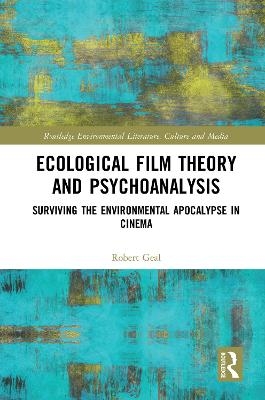
Ecological Film Theory and Psychoanalysis
Routledge (Verlag)
978-0-367-37341-2 (ISBN)
Ecological Film Theory and Psychoanalysis argues that these films exploit cinema’s inherent Cartesian grammar to construct texts in which not only small groups of protagonist survivors, but also vicarious spectators, pleasurably transcend the fictionalised destruction. The ideological nature of the ‘lifeboats’ on which these survivors escape, moreover, is accompanied by additional elements that constitute contemporary Cartesian subjectivity, such as class and gender binaries, restored nuclear families, individual as opposed to social responsibilities for disasters, and so on. The book conducts extensive analyses of these processes, before considering alternative forms of filmmaking that might avoid the dangers of this existing form of storytelling. The book’s new ecosophy and film theory establishes that Cartesian subjectivity is an environmentally destructive ‘symptom’ that everyday linguistic activities like watching films reinforce.
This book will be of great interest to students and scholars of film studies, literary studies (specifically ecocriticism), cultural studies, ecolinguistics, and ecosophy.
Robert Geal is a Lecturer in Film and Television Studies at the University of Wolverhampton, UK, where he teaches classes on film spectacle, representation, adaptation, psychoanalysis and Japanese cinema. He is the author of the monograph Anamorphic Authorship in Canonical Film Adaptation, as well as numerous articles and chapters on topics including science fiction spectacle, sexuality and gender in animation, race in television comedy, adaptation studies and film theory.
Introduction 1. Environmental crisis and epistemological crisis: Ecologically-destructive Cartesian subjectivity 2. Cinema spectatorship as an illusory Cartesian ‘symptom’ 3. Realist film as cogito-centric film 4. Surviving environmental disasters in film ‘lifeboats’ 5. Surviving environmental apocalypse in film ‘lifeboats’ 6. Survivors in post-apocalyptic environmental dystopias 7. The possibilities of non-Cartesian film Conclusion
| Erscheinungsdatum | 14.07.2021 |
|---|---|
| Reihe/Serie | Routledge Environmental Literature, Culture and Media |
| Verlagsort | London |
| Sprache | englisch |
| Maße | 156 x 234 mm |
| Gewicht | 689 g |
| Themenwelt | Kunst / Musik / Theater |
| Geisteswissenschaften ► Psychologie ► Psychoanalyse / Tiefenpsychologie | |
| Naturwissenschaften ► Biologie ► Ökologie / Naturschutz | |
| Sozialwissenschaften ► Kommunikation / Medien ► Medienwissenschaft | |
| ISBN-10 | 0-367-37341-6 / 0367373416 |
| ISBN-13 | 978-0-367-37341-2 / 9780367373412 |
| Zustand | Neuware |
| Haben Sie eine Frage zum Produkt? |
aus dem Bereich


